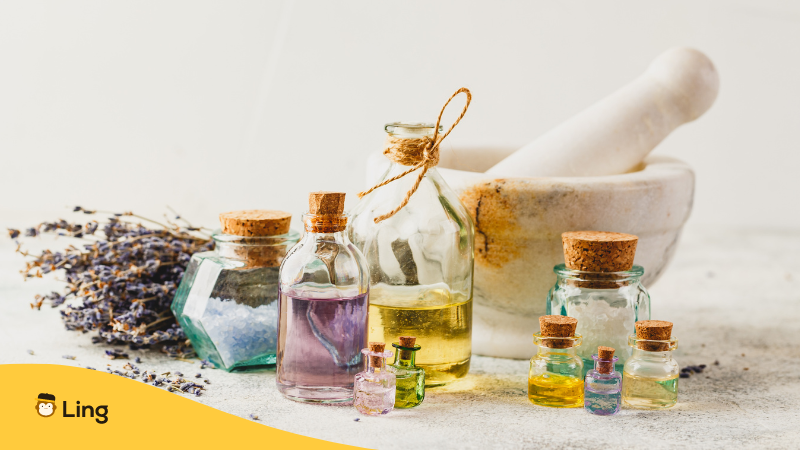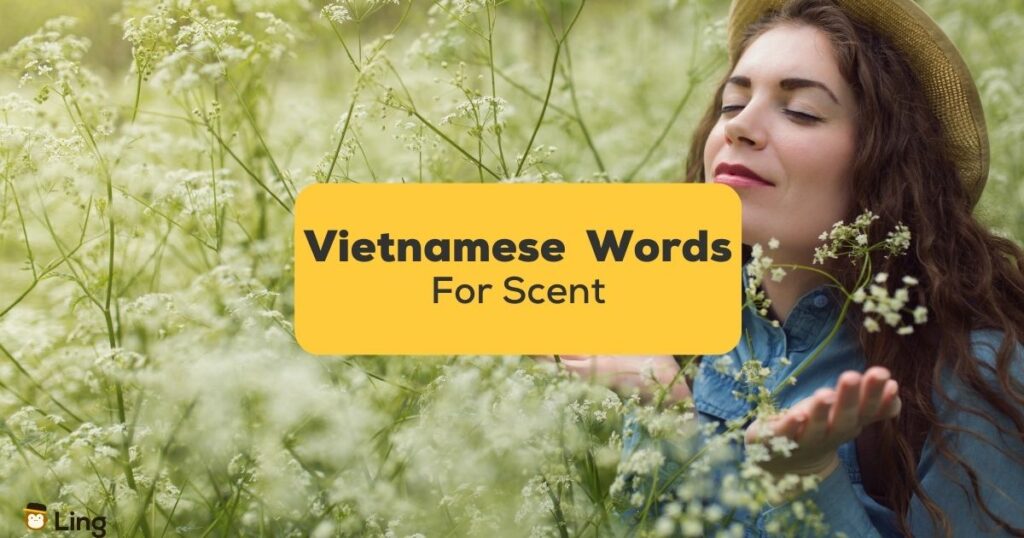In bustling urban metropolises such as Ho Chi Minh City, the atmosphere weaves a complex tapestry of diverse fragrances and aromas. From the enticing scents emanating from street food vendors to the less agreeable hints of exhaust fumes and the delicate, sugary aromas of blooming blossoms, the Vietnamese language bestows upon us a meticulously crafted lexicon to encompass the full spectrum of olfactory experiences.
Come, and accompany me on a captivating expedition as we delve into this compendium of Vietnamese words for scents!
Basic Vietnamese Words For Scents
Before we immerse ourselves in the symphonic world of Vietnamese scents, poised to stimulate your olfactory receptors, let’s establish a robust foundation with fundamental terminology. These words represent the stalwart roots of a fragrant garden, indispensable for anyone wanting to experience Vietnamese perfumes.
“Hương” – The Quintessence Of Fragrance
This word encapsulates the very essence of fragrance within Vietnamese culture. Basically, “Hương” transcends mere vocabulary; it embodies the profound spiritual link of a nation to nature and the aromatic experiences that saturate daily life.
The origin of “hương” can be traced to age-old Vietnamese traditions where incense and aromatic offerings played a pivotal role in religious rituals and ancestor veneration. Across centuries, “hương” has evolved to encompass a broader spectrum of scents, spanning from the pleasant smells of blossoming flowers to the fragrant spices that grace Vietnamese culinary creations.
“Mùi” – The Aroma Of Nature
While “hương” serves as the comprehensive term for fragrance, Vietnamese employ “mùi” to describe specific scents, particularly those drawn from the natural realm. “Mùi” may connote the fragrance of a dense forest, the aromatic aura of a blooming flower(rose), or the evocative scent of freshly harvested herbs. “Mùi hương” evokes the term fragrance.
The historical roots of this term are intricately intertwined with the Vietnamese people’s intimate relationship with the natural world. Vietnam’s lush landscapes, dense forests, and abundant flora have indelibly shaped the nation’s linguistic tapestry, with “mùi” standing as a testament to the pivotal role of the natural world in Vietnamese culture and mind.

“Thơm” And “Hôi” – The Spectrum Of Fragrances
“Thơm” and “hôi” represent two opposite facets of olfactory vocabulary.
“Thơm” signifies a delightful, sweet, or aromatic fragrance. It describes the redolence smell of a blossoming flower, the aroma of a delectable repast, or the crispness of freshly laundered linens. Vietnamese frequently invoke “thơm” to evoke positive sensory experiences and an appreciation for life’s splendid scents.
On the contrary, “hôi” is the chosen term to depict unpleasant or noxious odors. Whether it’s the pungency of fermented fish sauce (nước mắm) in Vietnamese culinary traditions or the malodorous emanations of stagnant water, “hôi” vividly portrays less desirable olfactory sensations.
“Tinh Tế” – The Subtle And Captivating Perfume
Is a term in the Vietnamese lexicon that perfectly encapsulates the concept of a delicate, understated, yet entrancing fragrance. It often finds application in describing scents that are not overpowering but possess a gentle, enchanting touch. “Ngát” is frequently associated with the scent of blossoms in the early morning or the fragrance of a loved one’s skin.
“Hương Vị” – The Fusion Of Aroma And Flavor In Culinary Delights
Vietnamese culinary artistry is renowned for its exquisite flavors and aromatic gastronomic creations, and the term “hương vị” impeccably encapsulates the inseparable fusion of aroma and taste. “Hương vị” translates to “flavor” or “taste,” yet it also encompasses the aroma and essence of a dish.
When Vietnamese individuals refer to “hương vị” they acknowledge the pivotal role that aroma plays in their culinary masterpieces. Whether it’s the fragrant broth of pho, the aroma of fresh herbs adorning spring rolls, or the spicy bouquet of chili peppers or even coffee, “hương vị” celebrates the harmonious marriage of aroma and flavor within Vietnamese cuisine.

Other Vietnamese Words For Scents
Thơm – Fragrant
Conveys the idea of something exuding a sweet and delightful aroma. It is often employed to describe the fragrant scent of fresh fruits, blossoms (such as roses), or enticing culinary creations.
Mặn – Salty
When depicting the sea breeze or the aroma of ocean air, “Mặn” encapsulates the unique saline essence for which coastal regions are renowned.
Cay – Spicy
Refers to the seasonings and spices that infuse Vietnamese cuisine with flavor and aroma. Think of lemongrass, citrus, ginger, and chili peppers imbuing dishes with their aromatic allure.
Mát Mẻ – Refreshing
This term evokes images of a cool, revitalizing aroma. It is often associated with the scent of earth after a refreshing rain shower or the invigorating zephyr on a scorching day.
Mùi Hương Quê Nhà – Scent Of Home
Is an expression that evokes profound nostalgia. It portrays the unique and delicate aroma of one’s homeland, an embracing and familiar fragrance.
Learn More Vietnamese With Ling
And there we have it! Did you enjoy this article? We hope that now that you have reached this part of the post, you developed an even deeper love for this Asian language. After all, it is one of the most unique languages out there!
Are you ready to learn the translations of your favorite words? Want to master the pronunciation, learn new words or expressions, and impress the locals in no time? If the answer to these questions is YES, then Ling is the key! Ling brings a world of culture, cuisine, and conversation straight to your fingertips. Ready to give it a try? Search the app out now on the App Store or Play Store today to download it for free!



































































